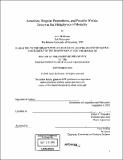Actualism, singular propositions, and possible worlds : essays in metaphysics of modality
Author(s)
Hoffmann, Aviv, 1964-
DownloadFull printable version (6.120Mb)
Other Contributors
Massachusetts Institute of Technology. Dept. of Linguistics and Philosophy.
Advisor
Robert C. Stalnaker.
Terms of use
Metadata
Show full item recordAbstract
My dissertation consists of three essays in the Metaphysics of Modality: In "A Puzzle about Truth and Singular Propositions," I consider two theses that seem to be true and then an argument for the conclusion that they form an inconsistent pair. One thesis is that a proposition that is singular with respect to a given object implies that the object exists. This is so because the proposition predicates something of the object. The other thesis is that some propositions are true with respect to possible worlds in which they do not exist. An example is the negation of the proposition that Socrates is wise. This proposition is true with respect to possible worlds in which Socrates does not exist, but it does not exist in those worlds. In "Actualism, Ontological Dependence, and Possible Worlds," I consider Actualism, the doctrine that every possible object is an actual object. Plantinga has argued that the actualist is committed to the existence of unexemplified essences if he analyzes statements of modality by quantifying over possible worlds and over members of their domains. I argue that the actualist is committed to the existence of unexemplified essences even if he paraphrases statements of modality by quantifying only over possible worlds and actual objects. In "Possibilism and the Nature of Actuality," I consider Possibilism, the doctrine that there are possible objects that are not actual objects. (cont.) Possibilism seems to be a coherent ontological doctrine. It is not Meinong's doctrine that there are objects of which it is true to say that there are no such objects. If one fails to distinguish between these two doctrines, then one's attempt to refute Possibilism might amount to an attack on a blatant contradiction. I illustrate this claim by arguing that the distinction between Possibilism and Meinong's doctrine has eluded Plantinga. I then consider the view that Possibilism is a consequence of Lewis's doctrine that 'actual' is an indexical term. I also argue that the sense in which Lewis said that 'actual' is indexical is an esoteric sense of the word, not a sense it ordinarily has.
Description
Thesis (Ph. D.)--Massachusetts Institute of Technology, Dept. of Linguistics and Philosophy, 2002. Includes bibliographical references.
Date issued
2002Department
Massachusetts Institute of Technology. Department of Linguistics and PhilosophyPublisher
Massachusetts Institute of Technology
Keywords
Linguistics and Philosophy.